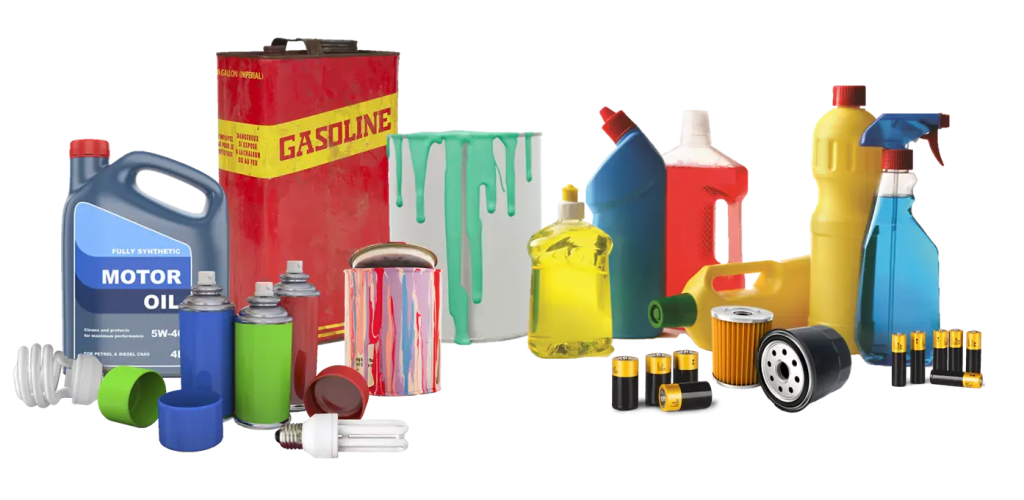Moving companies can handle a lot, but there are some items they simply can’t move. Whether it’s due to legal restrictions, safety concerns, or the risk of damage, there are certain belongings that even the most experienced removalists will avoid. Knowing about these restrictions ahead of time ensures there are no surprises on moving day, and allows you to make alternative arrangements well in advance.
In this guide, we’ll explore the types of items that movers may refuse to transport.
Key Takeaways:
Movers may decline to move certain items due to their capabilities, ethical considerations, or legal constraints.
- Hazardous materials: Items like chemicals, cleaning supplies, oil, and gas bottles are too risky to transport.
- Sharp items: Fragile items like glass, mirrors, and other sharp objects can break easily and cause injury.
- Perishables: Food (fresh, frozen, or dairy) and plants can spoil during transit.
- Important documents: Irreplaceable documents such as passports, birth certificates, and financial records should be kept with you.
- High-value items: Jewellery, cash, and valuable collectibles are high-risk and are best transported personally.
- Large appliances: Bulky items like refrigerators and washing machines can be difficult to move and may require special handling.
- Specialty items: Complex or fragile items like pianos or pool tables may need expert movers with specific experience.
- Living beings: Pets and livestock require specific care and legal considerations that movers typically cannot provide.
- Illegal items: Movers will not transport illegal items, such as weapons, drugs, or stolen goods.
Hazardous Materials

To begin with, your removalists are strictly forbidden from transporting hazardous materials that pose a risk to people, property, and the environment. These substances, often flammable, corrosive, toxic, or even explosive, must either be properly disposed of or handled by a specialised company equipped to move them safely.
The 9 Classes Of Dangerous Goods
Dangerous goods substances and articles are allocated to one of 9 classes.
- Class 1: Explosives
- Class 2: Gases
- Class 3: Flammable liquids
- Class 4: Flammable solids
- Class 5: Oxidising substances and organic peroxides
- Class 6: Toxic and infectious substances
- Class 7: Radioactive material
- Class 8: Corrosive substances
- Class 9: Miscellaneous dangerous substances and articles
For more information on the above classifications and how you might transport or dispose of them, take a look at The Australian Dangerous Goods Code (ADGC), which covers more common dangerous goods such as paints, LPG, and petrol. They will also provide advice or referrals for other classes of dangerous goods.
You can also find more from AFRA (Australian Furniture Removals Association) on item eligibility.
Chemicals And Cleaning Supplies
Even common household items can be unexpectedly hazardous, as they carry the risk of spilling, leaking, or causing unforeseen reactions during transit. As a result, your removalists will likely decline to transport:
- Bleach – highly corrosive and can cause burns.
- Paint and paint thinners – flammable and can give off toxic fumes.
- Gasoline and other fuels – extremely flammable and explosive.
- Pesticides and herbicides – toxic fumes and harmful to skin.
- Pool chemicals – corrosive and harmful to skin and eyes.
- Aerosol cans – pressurised containers that can explode under pressure or heat.
How To Safely Transport Or Dispose Of Chemicals And Cleaning Supplies
- Household Chemical Cleanout: The NSW Government offers a free service allowing you to safely dispose of household chemicals. This service is intended for residential use only and does not cover commercial waste.
- Transportation Tips: If you choose to use this service, make sure your items are securely sealed, transported in well-ventilated vehicles, kept upright, and away from any heat sources.
- Hazardous Waste Collection: If you prefer not to transport your chemicals yourself, you can hire specialist companies that will come to your location and safely collect them for you.
Explosives and Firearms
Most removalists are legally unable to transport explosives or firearms, as these items require special licenses and handling to ensure public safety. This includes items such as ammunition, fireworks, firearms, and gunpowder.
Transporting or Disposing of Explosives and Firearms
- Contact Authorities: Reach out to local police or firearms licensing authorities, like the NSW Firearms Registry, for guidance on safely disposing of or storing firearms and ammunition.
- Consult Licensed Professionals: Speak with licensed firearms dealers or specialized transportation services that handle firearms and explosives. The NSW Firearms Registry can also provide recommendations for these services.
- Important Reminder: Never dispose of unwanted firearms or explosive materials in public or household garbage bins.
Perishable Items
When moving in Sydney or beyond, many companies exclude perishable items from their services due to legal restrictions, concerns about pests, spoilage, and hygiene risks.
Perishable Foods
Temperature fluctuations and movement during transit can easily cause spillage or spoilage of perishable items, including:
- Fresh produce like fruits, vegetables, and herbs
- Dairy products such as yogurt, eggs, cheese, milk, and related items
- Frozen foods, including ready-made meals, ice cream, processed foods, and meats
- Fresh meat, which can quickly spoil if not kept refrigerated
- Opened containers of food that would otherwise be stable if sealed
What to Do with Your Perishable Food
- Consume before moving: Plan your meals leading up to your move to use as much of your perishable food as possible.
- Donate to food banks: Unopened, non-perishable food can be donated to local food banks to help others and avoid waste. Consider donating to organizations like Food For Change.
- Use coolers: If your move is short-distance, consider transporting your perishable food items yourself using cooling bags and ice packs.
Plants are considered perishable items

Although they aren’t for consumption, plants are classified as perishable items. If you’re planning an interstate move or using backloading services, it’s essential to check with local authorities about quarantine regulations, which are in place to prevent the spread of pests and diseases.
Items in this category include houseplants, potted plants, succulents, garden plants, trees, shrubs, and flowers.
What to Do with Your Plants
- Moving Locally: If you’re relocating within the same state or territory, you can transport your plants in your own vehicle.
- Moving Interstate: If you’re moving to Sydney from another state, check NSW biosecurity regulations to determine if any permits or inspections are required.
- Alternative Options: Consider gifting your plants to friends or neighbors, or donating them to local community gardens or centers.
Personal and Sentimental Items

While some moving companies might agree to transport personal or sentimental items as special cargo, it’s more common for them to decline due to the fragile, valuable, or irreplaceable nature of these belongings. If you own any of the following items, you may need to handle their transport yourself.
Important Documents
Important paperwork and documents are often fragile, irreplaceable, and hold significant personal and legal value. Losing these documents could lead to complicated, expensive, or even impossible replacement processes.
Examples of important documents include:
- Birth certificates
- Passports and ID cards
- Financial records like tax returns, bank statements, wills, and deeds
- Medical records
- Insurance policies
Transporting Important Documents If your Sydney moving company prefers not to take responsibility for transporting your documents, consider the following options:
- Carry them: Keep your documents in a secure bag or folder that stays with you throughout the move.
- Digitise them: Make digital copies and store them in a secure cloud service or external hard drive. However, remember that digital copies are not substitutes for official documents when originals are required.
Sentimental Items

We all have belongings in our homes that hold significant personal value, whether passed down by family, gifted by friends, or earned through hard work. Due to their emotional worth, removalists may prefer that you transport these items yourself.
Note: La Nova Removalists offers a special fragile removalist service in Sydney.
Items you may need to transport yourself include:
- Family heirlooms such as antiques, inherited belongings, jewelry, and ornaments
- Photos and scrapbooks, which are fragile and irreplaceable if lost or damaged
- Artwork and crafts created by family, friends, or loved ones
Transporting Sentimental Items If your Sydney removalists decline to move sentimental items like these, you’ll need to take extra precautions:
- Pack carefully: Use high-quality packing materials to ensure your items are well-protected.
- Transport personally: For large or bulky items, you may be able to find specialized movers willing to take on the risk.
High-Value Items
Many removalists avoid transporting high-value items due to the increased liability and risk, even though special insurance policies can be arranged. While they do everything possible to safeguard your belongings, certain items are simply too risky to handle.
High-value items include:
- Jewelry and cash, which are prime targets for theft and easy to lose due to their small size. These items, often made of precious metals like gold and silver, or containing gemstones like rubies and diamonds, are usually best transported by the owner.
- Other high-value items can include rare stamps, coin collections, fragile artworks, vintage comic books, and sports or film memorabilia.
Transporting High-Value Items If your removalists refuse to transport high-value items, consider the following options:
- Take them yourself: Personally transporting these items ensures they remain safe and under your control. Be sure to pack them securely and drive carefully.
- Use a specialised service: You may find a separate company that specialises in handling high-value items and is equipped to manage the risks involved.
Electronics
Most Sydney moving companies will move common household electronics like TVs, stereos, and computers. However, as the value and fragility of the items increase, so does the likelihood that they won’t.
Items that might require special handling include:
- High-end computers, such as expensive laptops and custom-built PCs, which can be worth thousands of dollars
- Large flat-screen TVs that don’t have their original packaging
- Audio equipment like speakers, amplifiers, turntables, and soundboards
- Cameras and lenses used professionally by filmmakers and photographers
If your electronics fall into this category, you may need to take extra precautions or find a specialized mover to ensure their safe transport.
Specialty Items

Specialty items often require unique handling techniques or specialized equipment due to their size, shape, weight, or delicate nature. As a result, many Sydney moving companies may lack the resources or expertise needed to move them safely.
- Pianos are both delicate and extremely heavy, requiring specialized piano movers who have the right tools and expertise to safely disassemble, transport, and reassemble them.
- Pool tables are prone to tearing or breaking if not handled correctly and need careful dismantling and reassembly.
- Large artwork or sculptures need specific crating and handling to ensure they are safely transported without damage.
- Hot tubs are large and expensive items that require careful planning to move. If you’re considering moving one, be sure to consult a guide on how to properly relocate a hot tub or spa.
Pets and Livestock
Transporting living creatures involves unique challenges that require specialized care for legal, ethical, and safety reasons. Therefore, standard removalist companies are not equipped to provide transportation services for pets or livestock.
Pets
Pets should never be treated as cargo; they have specific needs, and removalist trucks are not designed to provide a safe or comfortable environment for them. Additionally, there are legal considerations when transporting animals across state lines. For more information, the NSW Government offers guidance on the licenses needed to transport native animals interstate.
Challenges movers face with pets include:
- Dogs and Cats: Require proper ventilation, temperature control, and regular breaks for exercise and bathroom needs during transport. Vaccinations may also be necessary if moving interstate.
- Birds and Small Mammals: Must travel in comfortable cages or carriers, with their specific food, health, and wellbeing needs addressed.
- Fish and Reptiles: Need to be transported in terrariums or aquariums, which are fragile, heavy, and require electricity to maintain water quality and temperature.
Tips for Moving Pets
- Hire specialist pet relocation services: These professionals have the knowledge, tools, and vehicles to ensure your pet’s well-being during the move and are well-versed in legal requirements.
- Transport them yourself: You can also move your pets on your own by following a detailed guide on how to relocate with pets.
Livestock
Moving livestock demands even more attention and specialization than household pets, and typical removalists are not equipped to handle them. Consider the following:
- Horses: Require specialized trailers and handlers to ensure their safety and comfort during transport. Due to their size and strength, stress can lead to dangerous situations.
- Cattle, Sheep, and Goats: Need ample space, ventilation, food, and water for the duration of the move.
- Chickens and Poultry: Must be transported in appropriately-sized crates or cages within temperature-controlled vehicles, with plenty of food and water.
Tips for Moving Livestock
- Work with a specialist livestock transport company: These professionals have the necessary large vehicles and trailers, along with the experience to ensure the well-being of your livestock and compliance with legal requirements.
Illegal Items
It goes without saying, but no removalist will knowingly transport illegal items. Moving companies in Sydney, like those elsewhere, are legally and ethically obligated to refuse the transport of any items prohibited by law.
Note: This information is not intended as legal advice.
If you’re unsure about what can or cannot be transported when moving in Sydney, the Australian Border Force provides a detailed list of illegal items. These include:
- Illegal drugs and controlled substances: Such as marijuana, cocaine, heroin, methamphetamine, ecstasy, and others within this category.
- Stolen goods: Items acquired illegally through fraud or theft.
- Contraband items: Prohibited items such as certain animals, plants, or cultural artifacts.
- Weapons: Including unlicensed or prohibited firearms, explosives, blades, or other dangerous weapons.
- Hazardous waste: Such as chemicals or medical waste.
- Large amounts of undeclared or stolen cash.
If you suspect someone is transporting illegal goods, it is your responsibility to report suspicious activity.
Talk To La Nova Removalists About What We Can Move For You
The guide above doesn’t cover every item a removalist might decline to move, but it should give you a solid understanding of what to expect. Contact us for more information.
